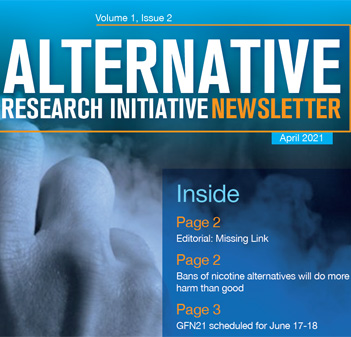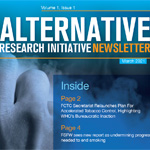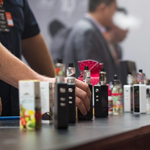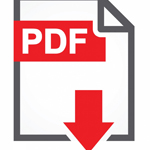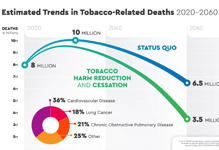Research Articles
Report Details Failures to Scale Up Tobacco Harm Reduction in Asia (April 20, 2021)
On April 16, the Global State of Tobacco Harm Reduction (GSTHR) released its newest report-"Tobacco Harm Reduction: A Burning Issue for Asia"-detailing how countries in the region have largely failed to consider safer nicotine products (SNPs) to combat the smoking-related death toll.
ARI Newsletter (Volume 1, Issue 2) (April 12, 2021)
Imagine the outrage if an international non-governmental organization (NGO) focusing on drug abuse called for naloxone manufacturers to not sell their products in low- and middle-income countries (LMICs) on grounds that it would confuse regulators and the public, suggesting instead that they focus on ending opioid abuse using only regulatory and educational approaches? How would NGOs in these countries react if this international NGO went further and called on governments to ban the use of naloxone? Recall that naloxone is about 85-95% effective in preventing death from an opioid overdose.
Bringing Everyone to the Tobacco Table (March 27, 2021)
In his new book, Good Business: The Talk, Fight, Win Way to Change the World, Bill Novelli describes, among other things, opportunities that may arise from working with a cancelled industry. Ultimately, however, Novelli's inconsistency on this stance reveals the power of cancel culture to stifle dialogue and impede clearheaded action.
With Excess Menthol Use Affecting Black Americans, U.S. Policy Efforts Continue to Fall Short (March 24, 2021)
In the United States, menthol cigarettes rose to popularity during the 1950s. At about the same time, manufacturers began focusing their marketing efforts on Black Americans. The effects of these campaigns can be felt today, with Black smokers making up more than one quarter of all menthol users in the United States.
Why Bans of Low-Risk Nicotine Alternatives to Smoking in Low and Middle-Income Countries (LMICs) Will Do More Harm Than Good (March 17, 2021)
In 2020, The International Union Against Tuberculosis and Lung Disease (The Union), a Bloomberg partner for 'The Initiative to reduce tobacco use', published its fourth position statement on e-cigarettes. In it, The Union called for a blanket ban on all electronic nicotine delivery systems (ENDS) and heated tobacco products (HTPs) in low- and middle-income countries (LMICs).
Newsletter (Volume 1, Issue 1) (March 09, 2021)
One of the targets of Sustainable Development Goal 3 is to "strengthen the implementation of the World Health Organization Framework Convention on Tobacco Control (FCTC) in all countries, as appropriate." The indicator for measuring the implementation of FCTC is "age-standardized prevalence of current tobacco use among persons aged 15 years and older."
New Zealand Proposes Vape Products Should Carry Health Warnings in Maori (February 17, 2021)
Under the new proposals, nicotine-containing vaping products would be required to carry a warning label pointing out their addiction potential in both English and te reo Maori, similar to the ones found on cigarettes.
An open letter from Darryl Tempest - Executive Director of the Canadian Vaping Association (February 17, 2021)
Beamsville, ON, Feb. 16, 2021 (GLOBE NEWSWIRE) -- For the better part of the last decade, advocates have fought for vaping to be recognised as a harm reduction tool for adult smokers. In the time since, science has caught up with the industry's message and vaping has been recognized by all health organizations as far less harmful than smoking. Yet, despite the overwhelming evidence concluding that vaping is less harmful, smokers and society at large are still being sent mixed messages by the government and misleading information by media to support a sensationalistic narrative.
FCTC Secretariat relaunches plan for accelerated tobacco control, Part II: A case study (January 25, 2021)
In Part I, I discussed failures in the implementation of the Global Strategy to Accelerate Tobacco Control 2019-2025 (GS2025). As that post indicates, there are many factors contributing to shortcomings on this front. In the current piece, I focus on one where a country, Thailand, which, in my opinion, is still facing challenges in reducing smoking rates despite putting in place policies as outlined in GS2025.
It's Time for America to Reclaim its Role in Global Health Leadership. (January 25, 2021)
For decades, the US was a leader in global health. It played a key role in establishing the World Health Organization (WHO), steered the eradication of diseases like smallpox, and guided the development of innumerable standards that underpin modern health policy. Then came the Trump Presidency. Over the past four years, and particularly throughout the COVID-19 pandemic, the administration repeatedly failed to embrace sound health policy, to disastrous effect. The election of Joe Biden must bring about a reversal of these failures.
Perspectives regarding the Report on the Tenth Meeting of the WHO (January 25, 2021)
Perspectives regarding the Report on the Tenth Meeting of the WHO Study Group on Tobacco Product Regulation to be considered at the 148th session of the Executive Board of the World Health Organization.
Accelerating change: foundation blog (December 23, 2020)
It was an era in which we became accustomed to daily death tolls broadcast on TV; work, school, and play shifted to virtual space; and masks served as both a life-saving accessory and confounding controversy. On many fronts, the era was marked by despair, not only from the virus proper, but also from the isolation.
FCTC Secretariat relaunches plan for accelerated tobacco control, highlighting WHO's bureaucratic inaction (December 17, 2020)
In 2018, the World Health Organization (WHO) adopted the Global Strategy to Accelerate Tobacco Control 2019-2025 (GS2025). Described as "a blueprint for the global tobacco control community," this strategy sought to accelerate implementation of the WHO Framework Convention on Tobacco Control (FCTC). Two years later, one cannot help but notice the absence of any report on progress toward this goal-an absence that was made all the more glaring when the WHO relaunched GS2025 last month. Intended to coincide with what would have been the Ninth Session of the Conference of the Parties to the FCTC (COP9), this relaunch only highlighted ongoing failures in policy implementation.
اردو مضامین
ترک سگریٹ نوشی کی مخالفت کیوں؟، ارشد رضوی

پاکستان سن 2002 میں ورلڈ ہیلتھ آرگنائزیشن ( ڈبلیو ایچ او ) کے فریم ورک کنوینشن آن ٹوبیکو کنٹرول (FCTC) کا رکن بنا تھا، تب سے اب ( 2023 ) تک اکیس سال گزر چکے ہیں پاکستان (اور دنیا بھر) میں سگریٹ نوشوں میں اضافہ ہی ہوا ہے۔ ایک رائے کے مطابق دو کروڑ نوے لاکھ ( 29,000,000 ) جبکہ بعض رپورٹس تین کروڑ دس لاکھ ( 31,000,000 ) سگریٹ نوشوں کی موجودگی کی بات کرتی ہیں، اگر پچیس کروڑ کی آبادی مان لی جائے تو پاکستان میں 12 فیصد آبادی تمباکو استعمال کرتی ہے۔
ترک سگریٹ نوشی میں مدد گار متبادل، ارشد رضوی

سگریٹ یا تمباکو نوشی کے نقصان دہ اثرات کے بارے میں ستر سال قبل ہونے والی ایک سٹڈ ی میں بتایا گیا تھاتب سے اب تک دنیا میں کروڑوں لوگ تمباکو سے متعلق بیماریوں کے باعث موت کی تاریک وادی میں جا چکے ہیں
صحت، تمباکو اور ریونیو، ارشد رضوی

تمباکو نوشی کا انسان سے رشتہ بہت پرانا ہے۔ تمباکو اور اس سے متعلق مصنوعات کی طویل تاریخ ہے جو 6000سال قبل مسیح میں ملتی ہے۔مقامی امریکیوں کے بارے میں کہا جاتا ہے کہ انہوں نے پہلے تمباکو کی کاشت شروع کی اور یہ 6000سال قبل مسیح میں ہی ہوا۔
انسانی صحت اور عالمی ادارہ صحت، ارشد رضوی

اگر عالمی ادارہ صحت کچھ مختلف طرزِ عمل اختیار نہیں کرتا اور تمباکو پالیسی میں جدّت کو قبول نہیں کرتاتو ادارہ دل، کینسر اور پھیپھڑوں کے امراض میں کمی کے اہداف کے حصول میں بہت پیچھے رہ جائے گا۔
جو فرد سگریٹ نوشی ترک کرنا چاہتا ہے اس کی نیکوٹین کی طلب اور نفسیات کو سامنے رکھتے ہوئے کونسلنگ کی ضرورت ہے، ڈاکٹر احسن لطیف

اگر ہم چاہتے ہیں کہ سگریٹ نوشی ختم ہو جائے تو سگریٹ پینے والوں کواس بارے میں تمام بحث میں سب سے آگے ہونا چاہئے تاکہ وہ اپنی ضرورتوں کا خیال رکھ سکیں۔
ما قبل کورونا اور ما بعد، ارشد رضوی
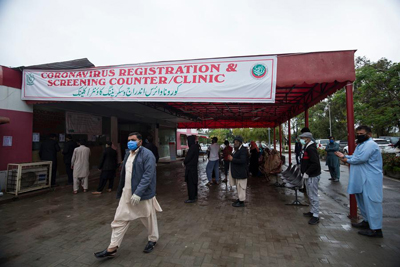
کورونا کے مابعد اثرات میں ایک خوفناک ترین اثر بڑے پیمانے پر دنیا کی آبادی کے ایک بڑے حصے کا خطِ غربت سے نیچے گِرنے کا اندیشہ ہے جس کے نتیجے میں بے روزگاری اور غربت میں غیر معمولی اضافہ ہو گا۔
OUR PROJECTS
Pakistan is a country with heavy use of tobacco. With more than 24 million...
Read MoreRESEARCH ARTICLES
The Birth of Harm Reduction Informs the World's Need for Safer Nicotine...
Read MoreWHAT WE DO?
Alternative Research Initiative (ARI) works to provide researched-based solutions...
Read More


